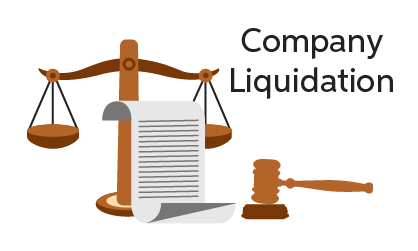
WHAT IS LIQUIDATION
Liquidation is compulsory winding up of a company by the court when an insolvent
company fails to pay off its liabilities owed to creditors. A creditor to the company
initiates the process by making an application to court.
Grounds for liquidation
A company may be put on compulsory liquidation if
1. The shareholders resolve to liquidated the company through a special
resolution
2. The company has not commenced active business for a period of 12 moths
since it’s incorporation.
3. The company has suspended its operation for a period 12 months
4. The company is unable to pay its debts whenever they fall due
5. The court finds that justice will be rendered by liquidating a company.
PROCEDURE OF COMPULSORY LIQUIDATION
The court procedure on liquidation is provided under the insolvency Act of Kenya.
Once an application for liquidation has been presented before court, the court shall
hear the application for liquidation. The court may allow or dismiss the application for
liquidation depending on the evidence presented. The court may dismiss the
application if the evidence presented does not warrant a compulsory liquidation or
give interim orders. The court may adjourn the application for liquidation if the
company demonstrates that it is coming up with a creditor’s arrangement. Thus, the
adjournment shall give the company time to finalize on the said arrangement.
An interim liquidator is appointed to safeguard the company’s assets pending a final
liquidation order. The court cannot decline to grant a liquidation order on grounds
that a company has no assets that can be disposed off to pay its liabilities. The court
may also grant a liquidation order to a company’s contributories if it finds just to do
so and if the said contributories are actively seeking for the company to be
liquidated. When a final order on liquidation is made, the liquidator shall commence
the liquidation process as under the act. His role shall be to safeguard, collect and
dispose the company’s assets and to pay the creditors in order of priority.
Legal effects of liquidation to a company
1. Any disposition of the company’s assets after a liquidation order without the
consent of the liquidator is void
2. Any transfer of shares or change of shareholders after liquidation order is
void.
3. A decree holder cannot attach and execute against a company that under
liquidation.
4. Distress for rent against a company undergoing liquidation is prohibited
5. One cannot sue a company under liquidation without leave of court.
Effects of liquidation to investors
When one chooses to invest in a company through shares, they expect to gain from
that investment. However, in a situation where a company is liquidated priority is
given to the company’s creditors and not its investors. The investors or shareholders
shall only be paid any returns on their shares once all the creditors have been fully
settled.
Where a shareholder is also a creditor in a company under liquidation, he shall be
paid a as creditor separately from his returns as a shareholder.
